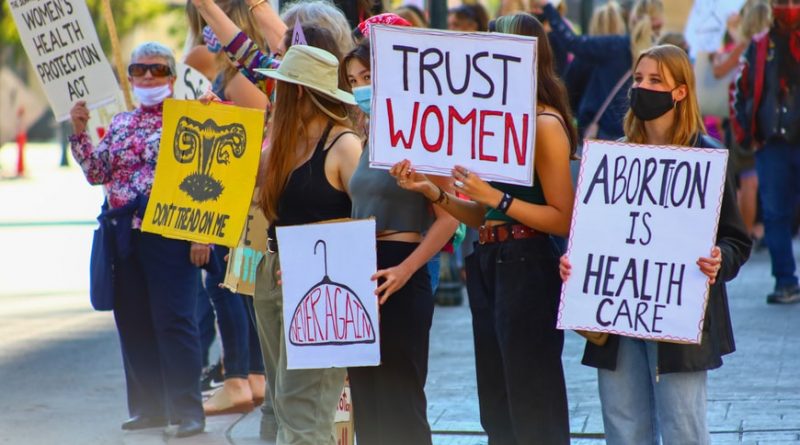New Abortion Laws in Texas Place the United States at a Moral Crossroad
Elsie Tierney
Staff Writer
Texas’ new abortion laws, which ban abortions six weeks post-conception with no exceptions for rape or incest, were signed into effect by Governor Greg Abbott on September 1, 2021. The laws are setting a dangerous precedent in the U.S., causing other states like Florida to propose increasingly restrictive laws. Meanwhile, Mexico’s laws are prohibiting judges from charging women who receive abortions, even in regions where abortion has not yet been decriminalized. The contrasting approach toward abortion between Mexico and Texas shows a dangerous trend that could lead the U.S. down a rabbit hole of restricting reproductive rights.
A more thorough reading of Texas’ abortion laws sheds light on this prediction. Per the law, abortion is restricted once cardiac activity is detected in the fetus after six weeks, regardless of whether cases involve rape or incest. This stands in sharp opposition to the Roe v. Wade Supreme Court decision, which allows abortions up to 24 weeks or “the point at ‘capability of meaningful life outside the mother’s womb.’” Furthermore, private citizens are allowed to sue any Texas abortion provider who violates the law or anyone who assists a woman in getting the procedure—people can be awarded up to a $10,000 bounty for turning in doctors performing abortions, albeit patients themselves cannot be sued.
While the laws claim the six-week time limit relates to the detection of cardiac activity, what is actually detected at six weeks is only an initial flutter of electric activity and not an actual heartbeat—the heart does not form until approximately nine weeks after conception. These factors make the laws some of the most restrictive laws in the developed world. Most European and G7 nations have a 12-week limit, with some exceptions. The United Kingdom has taken action to limit the interaction between anti-abortion protesters and patients outside of care facilities. Japan, Finland, and India have exceptions written into their abortion laws accounting for socioeconomic factors or women’s health reasons. Even Poland, which does not allow abortions at any point during pregnancy, has exceptions for cases of rape or incest. The Texas laws defy all these exceptions and measures taken by developed and largely democratic countries.
Last year, the human rights group Amnesty International defined laws rendering abortion illegal under all circumstances as “ effectively amount[ing] to torture, discrimination, and the denial of some of the most basic human rights to life and to dignity.” Not long after, courts in Coahuila unanimously decided to decriminalize abortion, making it illegal for a court to punish a woman for getting an abortion up to 12 weeks of pregnancy similar to the laws in four other Mexican states where abortion is legal. While these new laws do not decriminalize abortion nationally, they open the door for the different regional governments to do so. Court President Arturo Zaldívar stated that this decision will not only affect Coahuila but also “establishes a historic precedent and obligatory criteria for all of the country’s judges.” Coahuila is historically known to be unsafe for women, with The Dallas Morning News calling it “synonymous with femicides, and gender violence by unknown assailants.” Therefore, as the region begins taking these strides towards national decriminalization, more states are likely to follow suit.
By contrast, the Texas laws have begun opening doors to more restrictive laws in the United States. On September 22, Florida filed a similar bill that would ban most abortions in the state and allow lawsuits against healthcare providers who defy the law. Not only would this new bill ban abortion after cardiac activity is detected, but it would also alter the legal language used in the state’s abortion laws, changing all references from a ‘fetus’ to ‘unborn child.’
Other bills have been proposed and rejected by Florida’s legislature before this bill. However, since the U.S. Supreme Court did not block the Texas law, the debate has now reopened. The irony surrounding the bills in Florida and Texas is well apparent. Throughout the COVID-19 pandemic, the legislatures of both Texas and Florida have been making headlines protesting mask mandates using the slogan, “my body, my choice.” Pro-choice activists have also used this language to promote reproductive rights. As such, the hypocrisy of these state governments to restrict women’s bodies while encouraging the disregard of rules during a global pandemic is stark.
The implementation of these abortion laws has begun pushing Texans to cross the border into Mexico to obtain legal abortions, generating more dangerous situations for women. Prior to the laws, Texans would also have to cross into Mexico for misoprostol, a pill that can be used to induce miscarriages. In the past, Mexican citizens often had to cross into Texas for injections, IUDs, and other forms of birth control. The Texas laws have now created an environment where the only way many women can receive a legal abortion is by crossing the border into Mexico.
The ease with which the laws have passed through the U.S. Supreme Court, despite pushback from the executive branch, has reignited debates in different states to create more restrictive laws. “The United States has the authority and responsibility to ensure that no state can deprive individuals of their constitutional rights through a legislative scheme specifically designed to prevent the vindication of those rights,” said U.S. Attorney General Merrick Garland to CNN. In spite of the active pushback from the federal government, the state governments are still able to maintain their power. On October 14, a federal appeals court said the laws should stay in force while the Department of Justice lawsuit will proceed through the courts. These new laws have established a new and very dangerous precedent for women not just in Texas but in the entire United States. They undermine the U.S. Constitution and its role as a beacon of freedom and upholder of human rights




